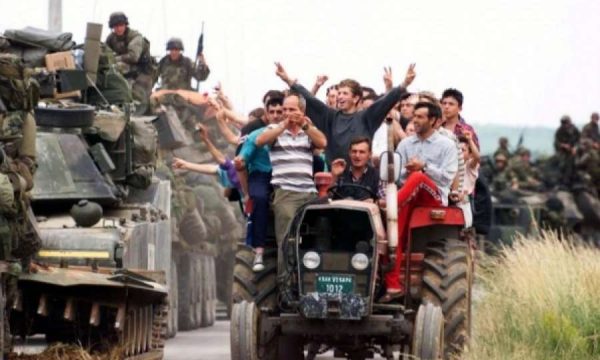23 years ago, 50,000 NATO soldiers were deployed in Kosovo, along with the United Nations Interim Administration.
This event today will be marked with numerous activities in the capital and other municipalities, such as homage by state leaders to the grave of former President Ibrahim Rugova, activist Adem Demaçi, Legendary Commander Adem Jashari and the Jashari family, honoring the Memorial Plaque of Soldiers fallen during service in the KFOR operation in Kosovo.
There will also be a performance by the KSF Wind Orchestra and the KSF Ceremonial Squad – from “Skënderbeu” Square to “Zahir Pajaziti” Square, as well as the central manifestation “From Exodus to Freedom” at the Museum Train, in Blace of Hani i Elezit, under the auspices of the Presidency of the Republic of Kosovo.
On June 12, 1999, after 78 days of US-led bombing by the US-led Western Military Alliance against Serb-Montenegrin military targets in Kosovo in Serbia and Montenegro, NATO troops entered Kosovo on the KFOR peacekeeping mission, ending the war. for almost two years between the Albanian insurgent population organized in the ranks of the Kosovo Liberation Army and the Serbo-Montenegrin military and police occupying forces. Appreciated by those who experienced it as a day of liberation and as one of the greatest days in the history of Kosovo, June 12, although not known as an official holiday, is a day when the military and world diplomats will remember how a day almost confrontation between the West and Russia, a day as it was said, ‘that could start the Third World War.’
The first NATO soldiers to enter Kosovo on June 12 were the Norwegian Special Forces and those of the British Special Air Service, coming face to face with Russian troops who the day before had ‘suddenly’ taken over the airport. Pristina with the aim of partitioning Kosovo.
Russia aimed to send thousands of reinforcements from the air, but after intervention by Washington, Bulgaria, Hungary and Romania rejected Moscow’s request to use their airspace.
After the US-British blockade of the airport runway, the Russian Foreign Ministry called the intervention of its soldiers ‘a mistake.’ And everything else is already history. NATO entry brought back over one million Albanians to Kosovo.
The entry of NATO soldiers paved the way for the return to their homes, land and country of over one million displaced Kosovo Albanians in dozens of countries and three or four continents of the world.
So far, close to 500,000 members of the peacekeeping forces of many countries, mainly in the West, have served in Kosovo, being away from their families and loved ones and sacrificing a part of their lives for freedom, security and peace in Kosovo.








